 As of the end of Day 3 of hand counting paper ballots in the MN U.S. Senate race between Democratic challenger Al Franken and incumbent Republican Norm Coleman, the total number of challenged ballots by both camps has now ballooned to more than 1500, even as the official gap of ballots that have now been tallied (versus the challenged ballots that will be adjudicated later by the state Canvassing Board) shrank slightly to 115. Franken's camp, however, now puts that number at less 100, based on their calculations of how election officials initially judged a number of those challenged ballots.
As of the end of Day 3 of hand counting paper ballots in the MN U.S. Senate race between Democratic challenger Al Franken and incumbent Republican Norm Coleman, the total number of challenged ballots by both camps has now ballooned to more than 1500, even as the official gap of ballots that have now been tallied (versus the challenged ballots that will be adjudicated later by the state Canvassing Board) shrank slightly to 115. Franken's camp, however, now puts that number at less 100, based on their calculations of how election officials initially judged a number of those challenged ballots.
After Day 2 on Thursday night, when the gap had stood at just 129 votes , we noted the quickly growing number of challenged ballots by each party, which would likely end up determining the final results of the election. The numbers of those challenged ballots has now increased exponentially, with just over 60% now counted out of 2.9 million originally cast.
Unlike Georgia, where another U.S. Senate race from November 4th is still undecided, at least there are ballots to be challenged...
 Here's a look at a handful of some of those challenged ballots from Minnesota Public Radio, which has been posting some of them, and allowing readers to decide which way they should be adjudicated in a readers' poll.
Here's a look at a handful of some of those challenged ballots from Minnesota Public Radio, which has been posting some of them, and allowing readers to decide which way they should be adjudicated in a readers' poll.
MPR also asked readers whether they thought "these ballots make the case for electronic voting?" We're happy to note that, almost to a person, the response from readers was akin to: "Are you frickin' kidding us?! Of course not!!!"
Naturally, The BRAD BLOG heartily concurs with those smart readers, and by way of emphasis points you to these disputed ballots from the still-undecided U.S. Senate race in Georgia, which will have a run-off on December 2nd:
...Oh, wait, there are no such ballots posted for transparent debate by the public or anybody else, because none exist. They use 100% invisible, unverifiable, reviewable-by-no-one, faith-based electronic "ballots" cast on touch-screen Diebold machines across the entire state. So nobody is able to determine if even one of them was recorded accurately as per any voter's intent.
That unfortunate fact has once again re-opened still more debate about the 2002 U.S. Senate race there, where Saxby Chambliss was reported by Diebold to have defeated incumbent Sen. Max Cleland, despite pre-election polls showing he should have lost, and despite the company having installed uncertified software patches, secretly, just days before the election. Unlike this year's MN race, the GA race in 2002, as well as the still-undecided 2008 race, will likely never be resolved to the public's satisfaction.
But back to MN, where every citizen can watch how things are going, and can ultimately have confidence one way or another in the results. Here's how the Minnesota Independent rounded up Day 3 of counting...
Ballots that failed to satisfy Coleman’s crew today numbered 404, for a three-day total of 778. Franken’s forces found 387 ballots questionable, for a grand total (so far) of 747.
That makes a combined total of 1,525 challenged ballots with only 60 percent of ballots recounted statewide — already surpassing the 1,500 mark which Secretary of State Mark Ritchie predicted only yesterday would be the number of challenged ballots from the entire recount that the State Canvassing Board would have to review. It’s a number that represents an arms race of ballot-attrition that both Coleman's and Franken’s camps condemned today — even as their campaigns ramped up the rejections.
It’s also a number that already dwarves by a factor of 13 the dwindling gap between Franken and Coleman, which now stands at 115. Unless the margin takes a giant leap over the remainder of the recount, the Canvassing Board looks to be the decider in Minnesota’s senate-election drama.
...
On Friday the Franken campaign claimed its gap with Coleman stood at fewer than 100 votes, counting election officials’ initial decisions on ballots that were later challenged.


 A Pretty Weak 'Strongman': 'BradCast' 10/30/25
A Pretty Weak 'Strongman': 'BradCast' 10/30/25 'Green News Report' 10/30/25
'Green News Report' 10/30/25
 Proposal for 'First Politically Viable Wealth Tax' Takes Shape in CA: 'BradCast' 10/29/25
Proposal for 'First Politically Viable Wealth Tax' Takes Shape in CA: 'BradCast' 10/29/25 Monster Storm, Endless Wars, Gamed Elections:
Monster Storm, Endless Wars, Gamed Elections: 'Green News Report' 10/28/25
'Green News Report' 10/28/25 Let's Play 'Who Wants
Let's Play 'Who Wants Sunday 'Cartoonists Dilemma' Toons
Sunday 'Cartoonists Dilemma' Toons Exiled NOAA Scientists Resurrect Critical Disaster Database: 'BradCast' 10/23/25
Exiled NOAA Scientists Resurrect Critical Disaster Database: 'BradCast' 10/23/25  'Green News Report' 10/23/25
'Green News Report' 10/23/25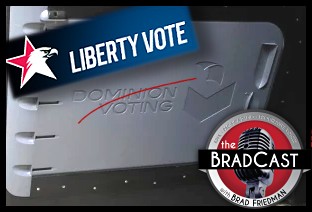 Trump-Allied GOP Partisan Buys Dominion Voting Systems: 'BradCast' 10/22/25
Trump-Allied GOP Partisan Buys Dominion Voting Systems: 'BradCast' 10/22/25 Trump, Republican Law(lessness) & (Dis)Order: 'BradCast' 10/21/25
Trump, Republican Law(lessness) & (Dis)Order: 'BradCast' 10/21/25 'Green News Report' 10/21/25
'Green News Report' 10/21/25 Celebrating 'No Kings': 'BradCast' 10/20/25
Celebrating 'No Kings': 'BradCast' 10/20/25 Sunday 'How It Started' Toons
Sunday 'How It Started' Toons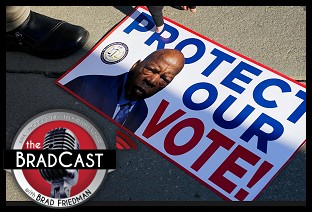 SCOTUS Repubs Appear Ready to Gut Rest of Voting Rights Act: 'BradCast' 10/16/25
SCOTUS Repubs Appear Ready to Gut Rest of Voting Rights Act: 'BradCast' 10/16/25 'Green News Report' 10/16/25
'Green News Report' 10/16/25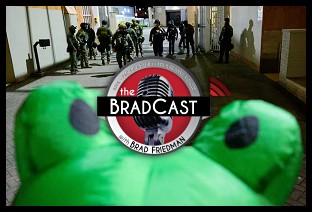 The 'Epstein Shutdown' and Other Autocratic Nightmares: 'BradCast' 10/15/25
The 'Epstein Shutdown' and Other Autocratic Nightmares: 'BradCast' 10/15/25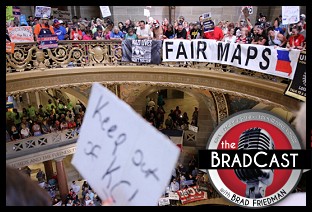 Group Vows to Block MO's GOP U.S. House Gerrymander: 'BradCast' 10/14/25
Group Vows to Block MO's GOP U.S. House Gerrymander: 'BradCast' 10/14/25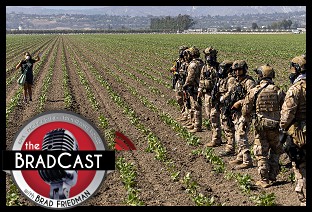 Trump Labor Dept. Warns Trump Policies Sparking Food Crisis: 'BradCast' 10/9/25
Trump Labor Dept. Warns Trump Policies Sparking Food Crisis: 'BradCast' 10/9/25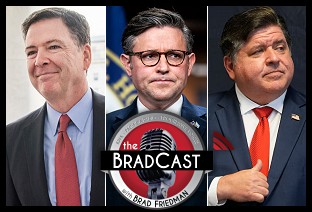 Trump's Losing Battles: 'BradCast' 10/8/25
Trump's Losing Battles: 'BradCast' 10/8/25 Trump, Roberts and His Stacked, Packed and Captured SCOTUS: 'BradCast' 10/7/25
Trump, Roberts and His Stacked, Packed and Captured SCOTUS: 'BradCast' 10/7/25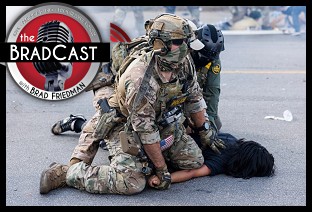 Trump Attempting His 'Invasion from Within': 'BradCast' 10/6/25
Trump Attempting His 'Invasion from Within': 'BradCast' 10/6/25 Biden Budget Expert: Mass Firings in Shutdown 'Illegal': 'BradCast' 10/2/25
Biden Budget Expert: Mass Firings in Shutdown 'Illegal': 'BradCast' 10/2/25 Why is DOJ Suing 'Blue' States for Their Voter Databases?: 'BradCast' 10/1/25
Why is DOJ Suing 'Blue' States for Their Voter Databases?: 'BradCast' 10/1/25
 VA GOP VOTER REG FRAUDSTER OFF HOOK
VA GOP VOTER REG FRAUDSTER OFF HOOK Criminal GOP Voter Registration Fraud Probe Expanding in VA
Criminal GOP Voter Registration Fraud Probe Expanding in VA DOJ PROBE SOUGHT AFTER VA ARREST
DOJ PROBE SOUGHT AFTER VA ARREST Arrest in VA: GOP Voter Reg Scandal Widens
Arrest in VA: GOP Voter Reg Scandal Widens ALL TOGETHER: ROVE, SPROUL, KOCHS, RNC
ALL TOGETHER: ROVE, SPROUL, KOCHS, RNC LATimes: RNC's 'Fired' Sproul Working for Repubs in 'as Many as 30 States'
LATimes: RNC's 'Fired' Sproul Working for Repubs in 'as Many as 30 States' 'Fired' Sproul Group 'Cloned', Still Working for Republicans in At Least 10 States
'Fired' Sproul Group 'Cloned', Still Working for Republicans in At Least 10 States FINALLY: FOX ON GOP REG FRAUD SCANDAL
FINALLY: FOX ON GOP REG FRAUD SCANDAL COLORADO FOLLOWS FLORIDA WITH GOP CRIMINAL INVESTIGATION
COLORADO FOLLOWS FLORIDA WITH GOP CRIMINAL INVESTIGATION CRIMINAL PROBE LAUNCHED INTO GOP VOTER REGISTRATION FRAUD SCANDAL IN FL
CRIMINAL PROBE LAUNCHED INTO GOP VOTER REGISTRATION FRAUD SCANDAL IN FL Brad Breaks PA Photo ID & GOP Registration Fraud Scandal News on Hartmann TV
Brad Breaks PA Photo ID & GOP Registration Fraud Scandal News on Hartmann TV  CAUGHT ON TAPE: COORDINATED NATIONWIDE GOP VOTER REG SCAM
CAUGHT ON TAPE: COORDINATED NATIONWIDE GOP VOTER REG SCAM CRIMINAL ELECTION FRAUD COMPLAINT FILED AGAINST GOP 'FRAUD' FIRM
CRIMINAL ELECTION FRAUD COMPLAINT FILED AGAINST GOP 'FRAUD' FIRM RICK SCOTT GETS ROLLED IN GOP REGISTRATION FRAUD SCANDAL
RICK SCOTT GETS ROLLED IN GOP REGISTRATION FRAUD SCANDAL VIDEO: Brad Breaks GOP Reg Fraud Scandal on Hartmann TV
VIDEO: Brad Breaks GOP Reg Fraud Scandal on Hartmann TV RNC FIRES NATIONAL VOTER REGISTRATION FIRM FOR FRAUD
RNC FIRES NATIONAL VOTER REGISTRATION FIRM FOR FRAUD EXCLUSIVE: Intvw w/ FL Official Who First Discovered GOP Reg Fraud
EXCLUSIVE: Intvw w/ FL Official Who First Discovered GOP Reg Fraud GOP REGISTRATION FRAUD FOUND IN FL
GOP REGISTRATION FRAUD FOUND IN FL

































